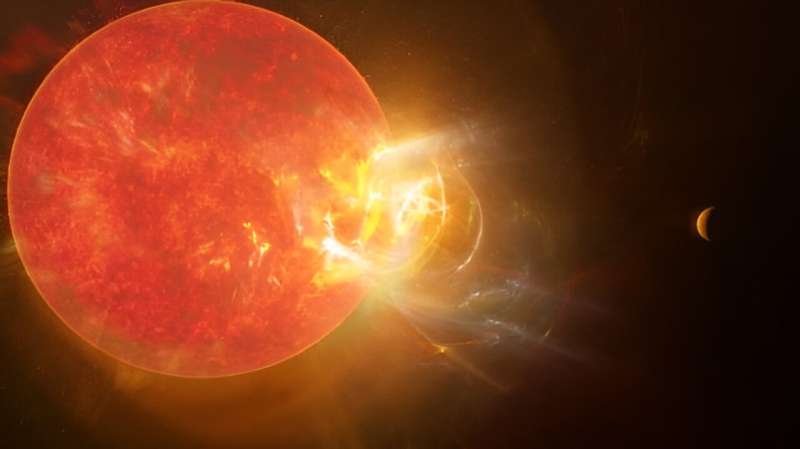This article has been reviewed according to Science X's editorial process and policies. Editors have highlighted the following attributes while ensuring the content's credibility:
fact-checked
preprint
trusted source
proofread
What impact does ozone have on an exoplanet?

As we discover more and more exoplanets—and the current total is in excess of 5,200—we continue to try to learn more about them. Astrobiologists busy themselves analyzing their atmospheres searching for anything that provides a sign of life.
It is quite conceivable, of course, that the universe is teeming with life based on very different chemistry to ours, but we often look to life on Earth to know what to look for. On Earth, for example, ozone forms through photolysis of molecular oxygen and is an indicator of life.
Using the James Webb Space Telescope, astronomers are searching for planets in the habitable zone of their star for the presence of ozone and how it impacts their climate.
It's tantalizing that 425 of the exoplanets so far detected exist in their star's habitable zone. It is in this region where the climate on the planet may well be suitable to sustain life. A significant subset of those planets are Earth-like in nature and will therefore have a fairly temperate climate.
In addition, they all seem to orbit M-dwarf type stars, which means they are likely to be impacted by tidal spin-synchronization (due to the effects of the tides, one face of the planet may well be kept facing the star). One impact of this is the potential for large contrast in daytime and night-time irradiation, which can drive strong convection on the day side of the planet.
The strong convection can drive winds around the equatorial region that are persistently faster than the rotation of the planet. It can also create Rossby waves, which naturally occur in the Earth's ocean and atmosphere—in any rotating fluids or gas. Together, these can control the distribution of chemicals in the atmosphere; in particular, ozone.
In Earth's atmosphere, the presence of molecular oxygen is an indicator of life since it is produced largely from photosynthesis in plants. The molecular oxygen collides with nitrogen in the atmosphere to produce ozone, so the presence of the latter is an indicator of biological processes. There is a chance, though, that the molecular oxygen in exoplanet atmospheres are the result of different ratios of near and far UV that can drive a nonbiological build-up.
In a new piece of research reported in a paper by lead author Paolo De Luca and team now posted to the arXiv preprint server, researchers report their findings of climate model simulations on Proxima Centauri b. The Earth-sized exoplanet orbits the red dwarf star Proxima Centauri, the closest star to our own at a distance of 4.2 light years.
They report that the analysis of atmospheres of tidally locked, Earth-like exoplanets received a massive boost as a result of the development of the James Webb Telescope. The team reveal that their climate modeling (including the use of interactive ozone) globally increases temperature in the stratosphere. This in turn induces regional variations of surface temperature and also reduces the temperature contrast between day and night side.
While the team have not been able to identify life on exoplanets, that was not their intention. What they have achieved is the ability to understand the exoplanet atmospheres using the James Webb Space Telescope, some of the processes that lead to atmospheric ozone and the impacts on temperatures.
More information: Paolo De Luca et al, The impact of Ozone on Earth-like exoplanet climate dynamics: the case of Proxima Centauri b, arXiv (2024). DOI: 10.48550/arxiv.2404.17972
Journal information: arXiv
Provided by Universe Today





















